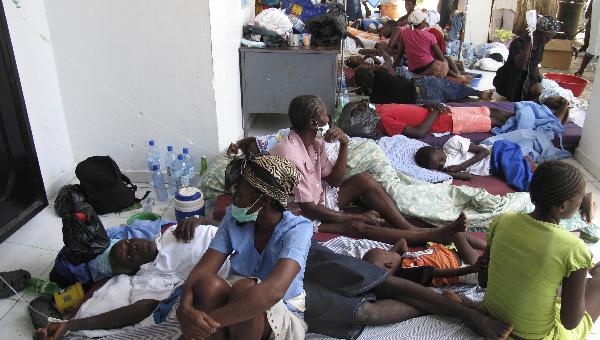Over 200 killed in Haiti cholera
About 208 people have died from a cholera epidemic in Haiti and more than 2,600 others were infected in the worst public health disaster to strike the earthquake-ravaged Caribbean nation.
Health officials said Saturday that 194 people died from cholera in the Artibonite region, north of the Haitian capital of Port-au-Prince, and 14 others died in neighboring Central Plateau, according to reports monitored.
More than 50 inmates at a prison in Mirebalais, just north of Port-au-Prince, have been infected with cholera, and three inmates have died, according to the officials.
The officials also said at least five people tested positive for cholera in Port-au-Prince, where about 1.3 million survivors of the Jan. 12 earthquake packed in squalid camps, raising fears of a much larger health emergency.
UN officials said the five cases, the first confirmed in the capital since the epidemic started, were people who had become infected in the main outbreak zone of Artibonite before they traveled to the capital.
Experts were investigating possible cases in a suburb of the capital which could act as a transfer point of the epidemic as a widely-used bus station was located there, an official with Haiti's national water agency said.
Haiti is now scrambling to contain the worst health emergency since the 7.0-magnitude earthquake in January killed about 250,000 people and also the first cholera epidemic in the country in a century.
Haitian President Rene Preval and Health Minister Alex Larsen visited the affected regions on Saturday, while the government said it was striving to provide clean water for residents.
Larsen has urged people to wash hands with soap, not to eat raw vegetables, boil all food and drinking water and avoid bathing in and drinking from rivers.
Aid groups are providing soap and water purification tablets and educating people in Port-au-Prince about the importance of washing hands.
On Friday, the Health Ministry asked the United Nations operations there to take charge in distributing medication that is being sent by international donors.
Cholera, a waterborne bacterial infection, is transmitted mainly through drinking contaminated water and unsanitary conditions. The Artibonite River, which irrigates Haiti's rural center and provides water for thousands of people, is believed to be contaminated.
Haitian health officials said severe floods and mud-rock flows triggered by recent heavy rains complicated efforts for aid groups to reach the cholera-affected areas.
The disasters have caused dozens of people dead or missing, acres of crops submerged, and many bridges and highways damaged.
For months, international aid organizations have warned that any outbreak of disease in Haiti could spread rapidly due to poor sanitary conditions in the camps where people have little access to clean water.
The cholera epidemic also caused concerns in neighboring Dominica, which has raised its vigilance to red level along its 360 km border line in a bid to prevent a spillover.
The international community has mobilized its resources to help the Haitian government respond to the outbreak of cholera, with medical supplies being provided and teams of health workers rushing to the affected area, a senior UN humanitarian official said in New York Friday.
Humanitarian agencies already have 300,000 doses of antibiotics in the country ready for distribution, Catherine Bragg, UN deputy emergency coordinator, told a news conference after returning from a visit to Haiti.
Some 10,000 boxes of water purification tablets, 2,500 jerry cans and the same number of buckets and hygiene kits are being distributed in the affected area, the official said.
 0
0 








Go to Forum >>0 Comments